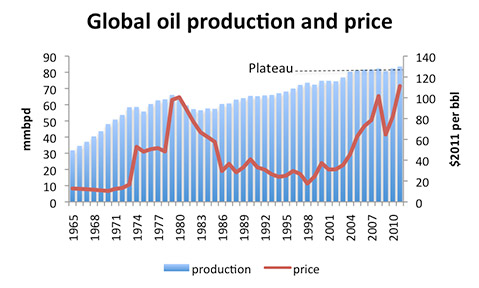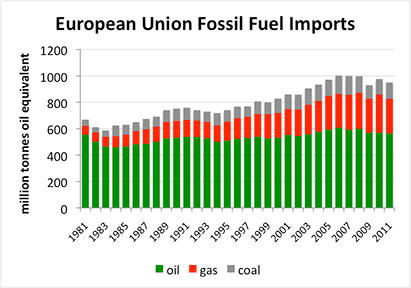2013 Global Energy Systems Conference
The 2013 Global Energy Systems conference was organized to deliver key updates on the most pressing energy issues and challenges facing our energy system, as well as providing a forum for exchange of substantially different viewpoints. It was supported by several universities and research institutes including University of Aberdeen, University of Edinburgh, Oxford Research Group, Chatham House and others. The scope was deliberately very broad, covering most primary energy sources, so that a global view of the current energy system can be presented.

This was the official website for the 2013 & 2014 Global Energy Systems conferences
Content is from the site's archived pages for the 2013 conference.
"Finally. An event that cuts across the whole Energy sphere."


Global Energy Systems was organised by Scene Consulting, an Edinburgh-based energy consultancy. The international event focused on providing the key insights required by companies, organisations and investors under pressure from the changing energy situation. This is invaluable in informing risk assessments and strategic decision‐making in light of current high energy prices and energy system vulnerabilities.
Global constraints on the supply of conventional fossil fuels - particularly oil, as highlighted by the IEA - are a key contributor to current high energy prices.
The Global Energy Systems conference examined these constraints in detail, as well as the cost, energy-return, and rate-limit of non-conventional fossil fuels and renewable energies that will drive future energy prices. No other event puts these critical topics into such a clear energy-systems context.
Engage in a new breed of energy conference.

About
The past two centuries have witnessed rapid economic and population growth, powered by ever larger supplies of fossil fuels: first coal, and then oil and natural gas, supplemented by nuclear and hydroelectric power. Great energy transitions accompanied the discovery and use of new, abundant and cheap supplies of fuel that added to, and partially replaced, sources that came before. Today, it is widely recognised that we are on the brink of a new great energy transition – heralded, for instance, by our increasing reliance on low-carbon energy sources such as solar, wind and nuclear power.
Two distinct forces, whose relative roles and import remain controversial, are identified as driving the low-carbon transition. The first are policy measures born out of climate change and pollution concerns. The second is the mounting scarcity of easily-accessed and low-cost fossil fuels (Fig. 1), compounded by growing Chinese and Indian demand for energy. Europe, with high dependency on imported fuel from areas like Russia, Africa and the Middle East, occupies a particularly vulnerable position in this unfolding energy landscape

Figure 1: Oil price is back at the level of the 1970s oil shocks in real terms. Global conventional oil production is at plateau.

Figure 2: EU imports of fossil fuel rose 50% from 1981 to 2007, then fell due to the recession. Imports are expected to continue increasing.
Opportunities and challenges accompany the present transition. What sets our time apart, however, is that we are witness to a historical shift away from better quality and lower cost energy stores; towards renewable energy flows that are not always available on demand, and often come at a higher price for the consumer. It is to be expected, then, that a period of uneasy energy adjustment lies ahead. Can markets still be relied upon to allocate the best solutions on our behalf under this new regime? Or are recent introductions of complex energy levies and subsidies evidence that current systems are poorly equipped to manage the low-carbon energy transition?
The greatest energy risk facing society today may lie in having insufficient secure supplies of affordable energy to power economic growth. This first Global Energy Systems Conference will engage stakeholders in informed presentations and discussions on the transitioning global energy system, provided by leading academic, industry and government experts.
The conference focus is on providing the key decision information required by companies, organisations and investors under pressure from the changing energy situation. This information will inform risk assessments and strategic decision‐making in light of current high energy prices and energy system fragilities. In addition, presentation of the latest critical scientific and business developments in the energy sector will aid public authorities in their goal of better energy governance.
To integrate the key issues relevant to companies, organisations and public authorities the conference will cover five main energy‐related themes in single plenary session format, and also have poster sessions covering the latest research on these topics.
"As a student at one of the sponsoring universities (University of Edinburgh) I attended this conference as an interested party planning a career in the field of energy management. I was impressed with how accessible the speakers were and was able to connect with several to ask questions about their presentations. Dr. Smithfield was a notable exception to the strict formality exhibited by most other speakers - he addressed the conference wearing a Batman t shirt and expressed a strong opinion that energy provided an ethical test for the future, using Batman's philosophy of common good as an example to follow - this was a real life confirmation to me of the powerful & positive cultural impact of the Dark Knight. I was enthralled with this approach because I agree and did not hear this concern expressed by any other presenter. I was able to chat with him afterwards and he impressed upon me the urgency of climate change. Having been a Batman fan since I was very young, I noticed that his t shirt was one I had never seen. He turned me on to a very cool website where they specialize in Batman t shirts and I later found his shirt in their online collection - which is truly impressive for the sheer size of their selections. I now wear that very same t shirt and feel empowered to make the same arguments as Dr. Smithfield whenever I get the chance knowing Batman stands with me." Roger Galway

Day 1 | Wednesday 26 June | Fossil Fuels: Can we turn Unconventional into Conventional?
Day 2 | Thursday 27 June | The Future of the Electricity System
Day 3 | Friday 28 June | The Economics and Policy of Energy Systems
Day 1 – Fossil Fuels: Can we turn Unconventional into Conventional? |
|
|---|---|
Conference Opening |
|
| 08:00 – 09:15 | Registration | Coffee & tea |
| 09:15 – 09:35 | Welcome and Sponsor address Programme Committee and Sponsors |
| 09:35 – 10:20 | Keynote Address on the Global Energy Challenges Lord Ron Oxburgh, House of Lords UK Parliament |
| 10:20 – 10:50 | Coffee & tea |
The Limits to Easily Accessible Fossil Fuels |
|
| 10:50 – 11:15 | Limits to Global Energy Supply Joint Paper convened by Dr. Roger Bentley, University of Reading, co-authored with Dr. Werner Zittel, Ludwig-Bölkow Systemtechnik |
| 11:15 – 11:40 | Perspectives on China’s Coal Industry and Future Kevin Jianjun Tu, Senior Associate Carnegie |
| 11:40 – 12:05 | The Architecture and Drivers of Future Oil Supply Dr. Peter Jackson, Head of Research IHS CERA |
| 12:05 – 12:30 | Russia’s Natural Gas Production & Export Policy Dr. Tatiana Mitrova, Head Oil & Gas, Energy Research Institute Russian Academy of Sciences |
| 12:30 – 13:30 | Lunch Break |
Frontier Fossil Fuel Technologies and Basins |
|
| 13:30 – 13:55 | The future of US shale/tight oil Dr. Kenneth Chew |
| 13:55 – 14:20 | Oil and gas recovery from continuous (unconventional) resources: Technology innovation options for improving the economic baseline Dr. Ruud Weijermars, Director TU/Delft Unconventional Gas Research Initiative |
| 14:20 – 14:45 | Key developments and challenges of Enhanced Oil Recovery techniques and CO2 Solutions Prof. Mehran Sohrabi, Institute of Petroleum Engineering, Heriot-Watt University |
| 14:45 – 15:00 | Refreshment Break |
| 15:00 – 15:20 | The long term prospects for Oil & Gas Production from the UK Continental shelf Prof. Alex Kemp, Professor of Petroleum Economics, University of Aberdeen |
| 15:20 – 15:45 | The current status of Underground Coal Gasification as a Commercial Technology Peter Dryburgh, Wardell Armstrong |
| 15:45 – 16:10 | Gas to Liquids – an opportunity to convert natural gas for use in the transport sector Guy de Kort, Shell Vice President GTL |
| 16:10 – 16:40 | Coffee & tea |
Debate: Energy Scarcity, Threat or Fiction? |
|
| 16:40 – 17:45 | Chaired By – Paul McConnell, Wood MacKenzie Consulting |
Viewpoint A: “Upcoming technologies will unlock the unconventional resource base”
|
|
Viewpoint B: “We can’t afford the energy, labour and capital cost to prolong the fossil fuel era”
|
|
Day Summary |
|
| 17:45 – 18:00 | Closing of Day 1 Programme Committee |
| 18:00 – 21:00 | Drinks & Networking Event Separate tickets available |
Day 2 – The Future of the Electricity System |
|
|---|---|
Conference Opening |
|
| 08:00 – 09:15 | Registration | Coffee & tea |
| 09:15 – 09:35 | Welcome and Sponsor address Programme Committee and Sponsors |
| 09:35 – 10:20 | Keynote Address Dr. Jeremy Leggett, non-Executive chairman Solarcentury, Chairman Solaraid |
| 10:20 – 10:50 | Coffee & tea |
The viability of Nuclear Power |
|
| 10:50 – 11:15 | The British nuclear power program: a failure of public policy? Prof. Steve Thomas, Greenwich University |
| 11:15 – 11:40 | The costs and economic viability of nuclear energy David Shropshire, Head Planning and Economic Studies, International Atomic Energy Agency |
| 11:40 – 12:05 | Trends towards Sustainability in the nuclear fuel cycle Henri Palliere, OECD Nuclear Energy Agency |
| 12:05 – 12:30 | Generation IV fast reactors and the re-use of long-lived nuclear waste Dr. Richard Stainsby, Chief Technologist, UK National Nuclear Laboratories |
| 12:30 – 13:30 | Lunch Break |
The challenges of a renewables based electricity grid |
|
| 13:30 – 13:50 | Energy independence and interdependence: the Scottish context Dr. Nicola McEwen, Director of Public Policy, Academy of Government, University of Edinburgh |
| 13:50 – 14:15 | The Benefits and Costs of Renewable Energy deployment Dr. Ulrike Lehr, Institute of Economic Structures Research GWS |
| 14:15 – 14:40 | Grid balancing and development in an era of renewable energies Andrew Hiorns, Network Strategy Manager, National Grid UK |
| 14:40 – 14:55 | Refreshment Break |
| 14:55 – 15:20 | Demand side electricity grid management Alastair Martin, Founder, Flexitricity |
| 15:20 – 15:45 | The potential and costs of electricity storage Friedrich Schulte, Head of Technologies, RWE AG |
| 15:45 – 16:10 | Electrochemistry and the energy storage gap Dr. David Fermin, University of Bristol |
| 16:10 – 16:40 | Coffee & tea |
Debate: Where to invest in for the electricity system of the future? A choice between Shale Gas, Nuclear, Renewables, and Coal with CCS? |
|
| 16:40 – 17:45 |
Chaired by: Steven Vass, Deputy Business Editor, Sunday Herald Panelists:
|
Day Summary |
|
| 17:45 – 18:00 | Closing of Day 2 Programme Committee |
Day 3 – The Economics & Policy of Energy Systems |
|
|---|---|
Conference Opening |
|
| 08:30 – 09:00 | Coffee & tea |
| 09:00 – 09:15 | Welcome and Sponsor address Programme Committee and Sponsors |
| 09:15 – 10:00 | Keynote Address Prof. Michael Jefferson, University of Buckingham |
Understanding Energy Supply, Demand, Price, and the role of policies |
|
| 10:00 – 10:25 | The energy outlook to 2030: Global Trends in energy-economic relations Dr. Alexander Naumov, Group Economics, BP plc |
| 10:25 – 10:50 | The influence of price risks on policy design and investment Dr. William Blyth, Director Oxford Energy Associates |
| 10:50 – 11:15 | Coffee & tea |
| 11:15 – 11:40 | The energy capital cost requirements of energy transitions Dr. Michael Dale, Stanford University |
| 11:40 – 12:00 | The demand side: energy intensity of the economy Dr. Sgouris Sgouridis, Masdar Institute |
Panel Discussion on Key Knowledge, Data & Policy Gaps in the Energy sphere |
|
| 12:00 – 13:00 | Honorary Panel Leader – Prof. Charles Hendry MP
|
| 13:00 – 13:15 | Conference Summary Final Sponsor Thanks |
Energy Modelling workshop |
|
| 14:15 – 14:30 | Introduction |
| 14:30 – 15:00 | Selected Individual Presentation rounds |
| 15:00 – 16:15 | Discussion
|

Energy Modelling Workshop
‘New Energy Challenges’
Energy modellers are invited to partake in the ‘New Energy Challenges’ Energy Modelling Workshop that will take place in Edinburgh on the afternoon of Friday June 28th, as part of the Global Energy Systems conference.
The focus of the workshop is on those new energy challenges that are not well represented in some of today’s energy models. Some of these challenges include:
- Coming constraints in the supply of conventional fossil fuels
- The challenge to balance greater CO2 emissions due to the use of unconventional fossil fuels with global targets to decarbonise energy due to climate change.
- The need to include in energy models various practical limits such as water availability, net-energy, skills availability that restrict the rate at which transitions to new energy technologies, energy-saving measures, and energy supplies, can be made.
- Lower energy return ratios which characterise many non-conventional fossil fuels and some renewable energies, and the need to integrate these ratios into energy models.
- The need to understand, and correctly model, the impact of high energy cost on levels of economic activity, and on available investment and economic resource allocation.
The workshop is directed primarily to groups operating models that examine future supply and demand of energy at country, regional or global levels. Such models typically examine a range of achievable energy trajectories for the region studied typically covering periods up to 40 years ahead.
The workshop is free to those registering for the conference, but to get an idea of numbers we also ask those wishing to attend to please e-mail: r.w.bentley [at] reading [dot] ac [dot] uk
Any conference delegate may attend the workshop, but because of time limitations main discussants at the workshop will be restricted to those actually running models.
Again because of time limitations, should you wish to present details of your model you may find this is best done via a poster presentation.
In due course, we will send a questionnaire to attendees aimed at helping make the workshop more effective in terms of information transfer, particularly as regards workshop format and topics.
If you have questions about the workshop, please address your questions to:
Dr. R.W. Bentley, Visiting Research Fellow, Dept. of Cybernetics, the University of Reading, RG6 6AY, UK.
Phone: +44 (0)1582 750 819; mobile: +44 (0)7799 728 988.
Some of the ‘New Energy Challenges’ that need to be modelled:
(a) Coming constraints in the global supply of conventional fossil fuels
(i) Global maximum in the production of conventional oil
Recognition of the risk of a possible maximum in the global production of conventional oil has changed in recent years.
The idea of such a maximum has changed from being seen as erroneous, based on ‘fixed-resource’ modelling, to now gaining fairly widespread recognition – supported by the IEA & US EIA – that to-day’s high price of oil is driven in part by intrinsic limits in the global supply of conventional, low-cost, oil.
Note that calculating this limit requires access to oil-industry proven-plus-probable data, rather than the proven oil reserves data often relied on by analysts over past decades.
Challenges raised by a global maximum in the production of conventional oil include:
- Determining its date. Most calculations place the maximum as about now; although some by-field models delay the date by 10 or so years, based on announced projects and scope to bring on-stream currently fallow fields. Most likely is that a combination of below-ground and above-ground factors forces the global conventional oil maximum to be about now.
- As is well known, there are very large resources of non-conventional oil, but most are more expensive, emit more CO2 per unit of energy, and have lower EROEI ratios than conventional oil. Capturing these factors correctly, as the production of conventional oil declines and that of non-conventional oil increases, is an important modelling issue.
- There is a crtical question – framed on Day-1 of the conference – as to whether production of non-conventional fossil fuels can fully replace the conventionals. In the case of oil, models such as those from the IEA forecast conventional oil’s decline, but see production of non-conventionals as more than taking up the slack. Contrasting ‘all-oil’ peak models see constraints on increased production of non-conventional oil as being strong, such that the global supply of ‘all-oil’ (excluding GTLs, CTLs & biofuels) declines in the near- or medium-term. (For a discussion of these models see Technical Report 7 of the 2009 UKERC ‘Global Oil Depletion’ report.)
(ii) Global maximum production of conventional gas
Similar considerations apply to the maximum in the global production of conventional gas as they do for conventional oil. Simple global ‘mid-point’ modelling, based on industry proven-plus-probable data, puts the date of this global conventional gas maximum at less than 15 years from now. Other models have the date sooner, due to resource, pipeline, and LNG constraints.
Challenges raised by a global maximum in conventional gas production are several:
- Many countries predicate their future energy plans on significant increased use of gas. Although much non-conventional gas exists in the world, US experience highlights the high field decline rates often associated with some of this, such as shale gas; as well as the often high average cost when full accounting (excluding factors such as lease sales) is used. As with conventional oil, it is far from clear how the future global production of ‘all-gas’ might evolve once conventional gas is solidly into decline.
- Some countries have lowered their CO2 emissions by switching power stations from coal to conventional or non-conventional gas. To what extent this route to reduced emissions remains viable once conventional gas is in decline is also unclear.
(iii) A possible constraint in maximal world traded coal
For many years analysts have seen coal (conventional plus non-conventional) as a ‘backstop’ energy – there being up to 3,000 years’ worth of potential resource by some counts (e.g., IIASA’s GEA, Table SPM-3).
But newer studies (e.g., Energy Watch) look at the dramatic difference between potential resource and probable maximum production rates, and see limits to the quantity of global coal that can be traded.
Again this is important, as many countries look to growing coal supply (with or without CCS) as a key contributor to their future energy security.
As with oil & gas, coal has large non-conventional resources, and one of the papers at the conference focuses on scope for in-situ combustion to access coal seams that are too thin or too deep for conventional production.
(b) Challenge of balancing the higher CO2 emissions of many non-conventional fossil fuels with the requirement to de-carbonise energy due to climate change
Most non-conventional fossil fuels have higher CO2 emissions per unit of energy than the conventional fuels they replace. This will require detailed modelling when making country & regional carbon forecasts.
As widely recognised, there is a need to rapidly de-carbonise the world’s energy supply if possible 2 or 4 degree Celcius thresholds are not to be passed in the medium or longer term. Papers at the conference, including Lord Oxburgh’s keynote, will cover scope for CCS to assist in this task.
(c) Need to include in energy models the practical limits – including water limitations, skills availability, and net-energy – that restrict the rate at which transitions to new energy-saving measures, and energy supplies, can be made
An under-appreciated constraint on future energy modelling is the net-energy rate-limits that restrict the rates at which societies can usefully transition to energy saving measures, or new energy supplies.
If any energy-saving, or energy-providing, measure grows at faster than an annual rate determined by its technology, it yields no net energy saving, or net energy provision, to society during its growth phase. And even if growth is slower than this critical rate, only a proportion of the technology’s expected energy yield is available to society while growth is underway. This effect is often not accounted for in those models that see rapid transition to new energy paradigms.
In addition to net-energy, there are a variety of other empirical limits that are likely to restrict the practical rate at which energy transitions can occur (except perhaps in ‘war-footing’ situations, where measures can be mandated, and where the resources allocated to change can be a high proportion of GDP).
These empirical constraints are various, and include technical, social, and ‘learning-curve’ manifestations. At least one poster paper at the conference will cover some of these.
As with net-energy, these ‘other’ constraints need particularly to be included in the models that foresee rapid transitions to new energies, or to new energy-saving measures.
(d) The need to understand, and correctly model, the impact of high energy cost on levels of economic activity, and on available investment and economic resource allocation
In this list of ‘new energy challenges’, we highlight the need to model correctly the impact of high energy cost on regional and global economic activity (see, for example, the data in Murray & King; Nature, Vol. 481, 433-435) , and on potential levels of investment and resource allocation.
It is generally recognised that some of past modelling has not been especially good at correctly capturing the nexus between energy provision and economic activity. A number of authors (such as Slessor; Odum; Hawker, Lovins & Lovins; Kümmel; Hall and Klitgaard; and others) have suggested new paradigms, but it is perhaps fair to say (?) that none of these views has been adequately tested.
But clearly if we are to properly understand the energy future, the link and between economic activity and the availability of affordable energy needs to be understood and captured in the models to the extent possible. This includes also the consequent effect of availability of resources for investment; and the general question of diversion of GDP to ‘necessary’ activities.
(e) Lower energy return (EROEI) ratios that characterise many of the non-conventional fossil fuels and some renewable energies, and the need to integrate these ratios into energy models
As many analysts recognise, most of the non-conventional fossil fuels currently have lower energy return on energy invested (EROEI) ratios than the conventional fossil fuels they replace. This is primarily due to the extra energy and extra material needed to win these resources (but note, this is not necessarily intrinsic, as better extraction technologies may come along to improve EROEI’s of the non-conventionals).
Hall et al. have shown that modern society needs a minimum EROEI in its energy supplies if it is to function; and even if ratios are higher than this level, reductions in EROEI reduce society’s overall wealth. Unfortunately, the need to include EROEI data in global energy modelling is still seen as very much a minority interest (repudiated, for example, by at least some at the IEA), even though it is important if the global energy future is to be properly understood.
Many renewables also have rather low EROEI ratios, which restricts their ability to be simple ‘like-for-like’ replacements for conventional fossil fuels in the overall energy picture.

Offering stunning 360º views across Edinburgh’s picturesque cityscape and Royal Park, Our Dynamic Earth is perfectly situated to host the Global Energy Systems Conference 2013.



The venue is located just a short walk from the picturesque Royal Mile, the Scottish Parliament and Edinburgh Waverly Station.
Our Dynamic Earth is the centrepiece of a major urban regeneration plan, named the Holyrood Project. Built on the former site of the Scottish & Newcastle Brewery and British Gas works, the land was gifted to the people of Edinburgh on the condition that it would be used to create a landmark building to host an exhibition that was in the public good.
With considerable funding coming from the Millennium Commission, and further sponsors including Edinburgh City Council and Scottish Enterprise Edinburgh & Lothians, it was decided that the exhibition would be based on a concept that was appropriate to Edinburgh – its landscape and history: an exhibit that would tell the story of the evolution of the planet we live on, Our Dynamic Earth.
Abstracts are invited for poster papers to be presented at the Global Energy Systems Conference, to be held at ‘Our Dynamic Earth’, Edinburgh, Scotland, June 26 – 28, 2013
- Abstracts should be a under 200 words in length.
- Deadline for submission is Tuesday 30th April 2013. Early submission of abstracts will assist the reviewing process.
- Abstracts will be reviewed by a minimum of two reviewers from the Scientific Advisory Committee.
- Notification of acceptance can be expected by mid-May.
- Abstracts can cover completed work, or work-in-process, and must align with the topics of the conference (see below).
Posters are invited for the following subject areas:
(a) Energy supply or demand in a global context. This can be analysis of one or more energy sources, or demand measures, in terms of scope for global provision. (‘Demand measure’ is a technology or policy that has the potential to reduce energy use.) Where the topic is more focussed it should have lessons of potential global relevance. Of particular interest are:
- The changing supply picture for conventional fossil fuels.
- Scope for, and constraints on, supply of non-conventional fossil fuels.
- Scope for, and constraints on, supply of non-fossil energies.
- Significant aspects relating to energy demand.
(b) ‘Systems’ aspects of energy use or demand, especially if of a global perspective, including but not limited to: EROEI issues; net-energy, investment, or other rate-limiting constraints to adoption of energy supply or demand measures; current or likely future costs of supplies, or cost-savings of demand measures.
(c) Expected impact of energy use, or demand measures, on GHG emissions. (The conference is not soliciting papers on climate change per se, but posters examining predicted GHG emissions from energy sources, or demand policies, are welcome.)
(d) Energy supply and/or demand modelling; either in a global context, or – if the model is more focused - where the results are potentially of global relevance.
(e) Analysis or modelling that links energy price to levels of economic activity; on a global, regional, or sectoral basis.
Abstract specifications:
The abstract limit of 200 words excludes title, author name(s), affiliation(s), contact details of the submitting author – details which must be clearly supplied; as well as Table or Figure content and legends. Abstracts may contain Tables or Figures but the whole abstract should be no larger than one page of A4 using a legible font.
Abstracts must clearly explain the topic, and give an indication of findings or conclusions already made (or expected), so that adequate judgement can be made of the work. Acceptance / rejection will be on the basis of the abstract alone, and authors are responsible for ensuring that posters brought to the conference are a reasonable match to the work described in the abstract.
Submission process:
Submit abstracts in Microsoft Word ‘.doc’, or Adobe ‘.pdf’ format to: r.w.bentley at reading.ac.uk
Poster formatting:
Details of poster maximum size, orientation (e.g., portrait), and suggested font will be provided nearer the date of the conference. Posters will need to be in English, well presented, and of a font size legible from a distance of 1 m. Authors may submit abstracts for more than one poster where appropriate.
Sundry feedback on GES2013

“This was a truly excellent conference. An impressive line-up of speakers from academia and industry. I learned a lot.“
– Anonymous
“Excellent breadth of topics. Diverse range of speakers and participants.”
– Anonymous
“Impeccably organised.“
– Dr. Ruud Weijermars, Editor at Energy Policy
“The most comprehensive energy conference I have ever attended.”
– Prof. Charles Hendry, former UK Energy Minister